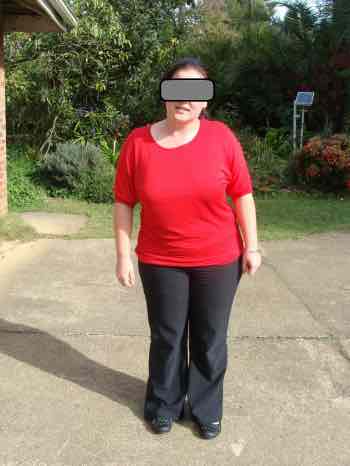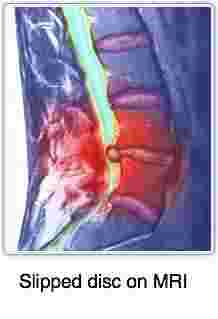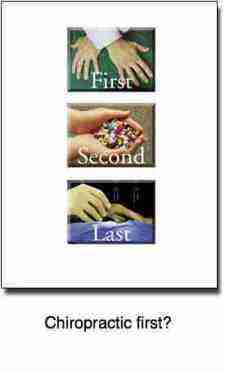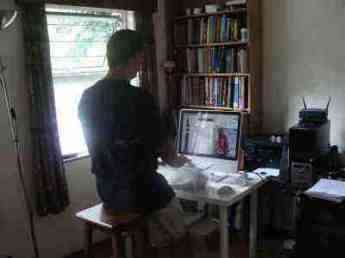- All You Need to Know
Slipped disc rules

Slipped disc rules may enable you to escape lower back surgery.
Very severe lower spine and leg pain is frightening for the patient and to be honest a challenge for your chiropractor and surgeon alike. Medicine itself coined the term FBS; failed back surgery.
The antalgic posture, which I call the sign of Pisa, means you have to stop, or the pain will go down your leg.
Both chiropractic and surgery are arts, as well as science, and there are many obstacles to overcome before a successful outcome can be achieved.
These slipped disc rules for use at home have been designed to shift the odds in your favour. They are not cast in stone; every lower back injury is different, and learning to listen to your own body is part of the challenge. Complications of surgery are readily acknowledged by medicine; just look at any of their sites.
It must be admitted that there are complications of chiropractic too, though I would contend they are far less severe than those of surgery. For a start there are none of the dangers of an anaesthetic.
Yes, I can assure you that failed back chiropractic exists too.
After you have had a seriously crooked back, only a lifetime of exercise and being sensible when it comes to heavy lifting, and perhaps an occasional regular chiropractic adjustment, will help prevent further episodes.
Our experience is that more episodes are probably inevitable no matter which route you go, but those who go through the discipline of exercises every day have these relapses far less often and recover more quickly.
Tingling in feet and legs
Tingling in feet and legs is a common scenario; add weakness and you're on the verge of surgery. Can you lift your big toe? And lift your heel off the ground? Is the knee collapsing on stairs?
Chiropractors are frequently faced with patients with very severe disc injuries causing burning leg pain, numbness and tingling and weakness in the lower limb. If there is paralysis of the muscles, typically an inability to raise the big toe or stand on the naughty leg with the heel off the ground, then surgery is usually immediately recommended by medicine.
You are then faced with either surgery or chiropractic adjustments and following these slipped disc rules.

- Chiropractic Conditions is a central page at our site. It provides you simply and easily with the sorts of diagnoses that the average DC would be treating.
- Healthy Living Tips is another vital page at Chiropractic Help. Sparkling wellbeing is not just about having your subluxations adjusted. This link gives you some insights into different foods you could and perhaps should be eating.
Searching for something specific? Just type it in here:
Help for sciatica pain
Help for sciatic pain is our chiropractic solution; I won't pretend that it's ever easy, though some folk respond miraculously quickly. Skillful chiropractic adjustments may save you from surgery, but a strict conforming to the following slipped disc rules is absolutely vital if you have very severe lower back and leg pain.
Interestingly, a combined medical and chiropractic research project indicated that there was no harm in delaying surgery, even in severe cases, with one important exception; the inability to urinate. That's a so called cauda equina syndrome and requires immediate medical attention, otherwise you'll have a burst bladder on top of your slipped disk.
Another, that if you first consult a medical doctor for lower back and leg pain you are more likely to end up the knife; the sooner that slipped disc is reduced the better.
- Leg pain muscle testing will help you work out if there is any paresis developing.

Severe Slipped Disc Rules
Slipped disc rules plus the right treatment and being sensible whilst your back is healing means you may not need that operation after all.
-
Don't sit at all, not at all*, for at least a week, and sometimes
several weeks. Stay out of the car as far as possible. Lying on the back seat may be
acceptable.
- Don't bend, not at all. If you have to pick something off the floor, go down on one knee.
- Try very hard not to cough or sneeze. Blow your nose if you feel a
sneeze coming on. Eat a fibre rich diet to prevent constipation.
An apple salad recipe, for example,
is perfect and our old friend the beetroot takes a lot of beating. All foods rich in soluble fibre are perfect; medical research shows that they beat the number one prescription for constipation; having to bear down hard when you have a slipped disc is often murder. Other slipped disc symptoms can be found at the page above.
- Ice your back twice or more times a day, either an ice massage for five
minutes, or an icepack wrapped in a face cloth for 20 to 30 minutes
followed by a little moist heat.
Cold hot therapy is the best anti inflammatory and painkiller.
- Do some very gentle lower back exercises prescribed by your chiropractor, perhaps even every fifteen minutes.
- Every hour get up from your bed of woe and go for a short walk around the house. Stay at home. Don't stand for too long, but you may "perch" for short periods. Place the keyboard on a small box if you are at the computer.
We used to be very strict about not sitting, but every back is different. Listen to your body; it will tell you what you should not be doing. I occasionally have patients who find that limited perching on the right stool actually is okay.
And very occasionally, sitting actually brings the greatest relief; but how is when you stand up after a prolonged period in the chair?
If you can't sit at all, and you may only stand for short periods, what other options are there? Go to bed and lie on your back with a cushion under the knees; when it becomes uncomfortable, roll onto your side with the pillow between the legs.
Keep on moving when the pain increases. Do the exercises every 15 to 30 minutes. Get up for a short period every hour during the day and perhaps once or twice at night.
Research suggests that lying flat on your back for long periods is not beneficial.
There is convincing evidence that bedrest alone will not help your back; in fact it may make it worse. These slipped disc rules do not advocate that; it's that plus chiropractic treatment and exercises done at home, with alternating ice and heat.
- Massaging bed rest is definitely part of the regimen.
- A couple cushions under the neck and upper back, whilst lying on supine will enable you to watch television or work on the laptop.
- Have you been waking up with low back pain for several months? It could be the bed; but, buyer beware. The most expensive brand is not necessarily the most suited to your spine and pelvis, and what suits you may not be to your spouse's liking.
More slipped disc rules
There are plenty more slipped disc rules; mostly they invoke using your own common sense. Notice how this young man is perching on a stool. If necessary raise the keyboard and monitor by placing bricks under the legs. Get someone else to do it, of course.

Chiropractic help
Chiropractic help is for you if you're fed up with what medicine has to offer, have no desire for surgery, and perhaps repeat surgery, but are prepared to go through the discipline of treatment, plus rehab, plus not sitting, and exercising great care during the healing phase.
But it will mean going through the discipline of these slipped disc rules; they are less boring than the recovery from surgery.
Aside: The last two occasions that we holidayed at our timeshare, by the third morning I had unbearable lower back pain. The bed was far too hard. They've had other complaints, and have promised new beds this year. I wonder what we'll find. There really is no universally good bed. My wife had no problem with the bed.
- Shower, don't bath. Ask s/he who must be obeyed to wash your feet!
- Stop smoking. It's THE greatest risk factor in not recovering from a slipped disc. Without 100% oxygen, that disc won't heal.
- Sexual intercourse is inadvisable at this time.
- Constantly keep the 50 percent less pain rule in mind.
- Don't keep your wallet in your back pocket. Why? Back pocket wallet ...
If
you can't (or won't?)
follow this regimen, to the letter, for several weeks, occasionally
six, your chiropractor probably won't win if you have a severe slipped
disc with hard neurological signs - numbness and weakness. Make a
choice: Abide by these
rules, otherwise don't waste your time and money. Go straight away for
LOWER BACK SURGERY ... skilfully done, it can be very successful.
- Femoral nerve damage ... read how I personally escaped a very severe sequestered lumbar disc by following Chiropractic help AND my own Slipped Disc Rules.
- Slipped disc symptoms case file - what awaits those who won't follow the rules.
- One of those rules is involvement in an active rehabilitation program once the you have minimal pain.
Disclaimer
There are very few deviations from these comments. If you have doubts, then discuss each of them with your chiropractor. Sitting, very occasionally, in some patients actually brings relief, and lying down aggravates the pain in the leg. But that's the exception that proves the rule.
These slipped disc rules are not in place of the appropriate treatment. Reducing that bulging disc is vital; as chiropractors, we think with a very carefully applied, specific spinal adjustment.
Having said that, the body has amazing healing capacity. Given time, common sense and these slipped disc rules, it's possible that you may not need any form of treatment. Cost is often a factor in the care of low back pain.
Slump test for sciatica
If you are following the no treatment path, please, after say two weeks make an honest assessment. Is it getting significantly better? The Slump test for sciatica will help you evaluate your progress. The really bad backs we manage almost always have a history of lingering lower back pain that's been neglected after an injury. When you know you need chiropractic help, don't be an ostrich.
Likewise, if you are on pills, seeing a chiropractor, or physiotherapist then, after three weeks make an honest assessment. Is the treatment helping? If it's not, perhaps it's time for a change.
Good luck. I hope you found this contributes to your dilemmas.
Upper leg pain
Interestingly, injuries to the upper lumbar spine causing pain and numbness in the front of the thigh and groin sometimes are aggravated by bedrest. Careful differential diagnosis is vital, as there are other conditions that cause groin pain, not to mention lymphomas.
Nevertheless if it's an upper lumbar spine slipped disc that's causing pain and numbness in the upper leg down the Femoral nerve distribution, then some of our slipped disc rules don't always apply. Sometimes lying down increases the pain.
Every case of lower back and upper leg pain needs to be carefully evaluated as it can be a hip or sacroiliac condition, or even a Maigne's syndrome.
USEFUL LINKS
- Low back pain on one side, radiates front to groin on bending backwards or toward the tender side.
- Return from slipped disc rules to HELP FOR SCIATICA PAIN …
- Food and inflammation
Did you find this page useful? Then perhaps forward it to a suffering friend. Better still, Tweet or Face Book it.
